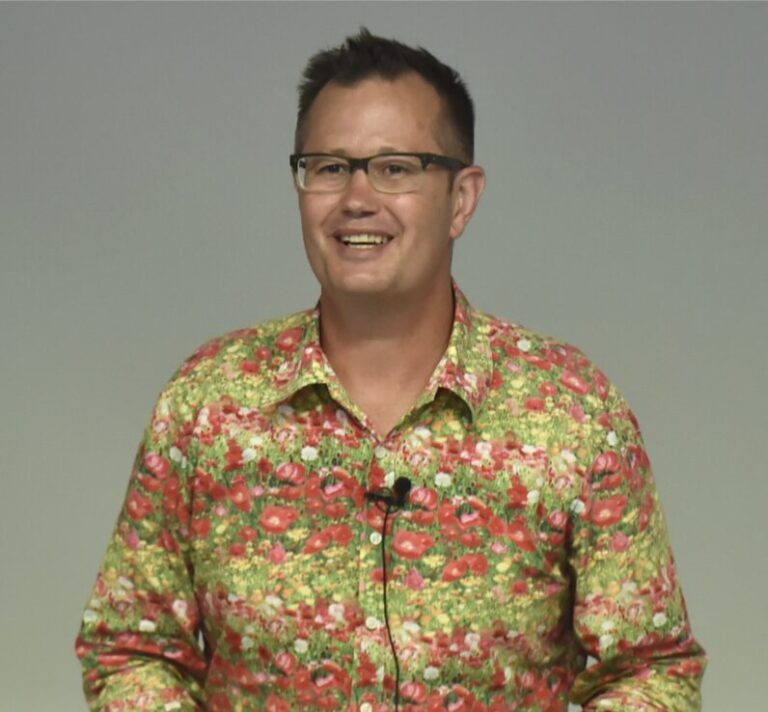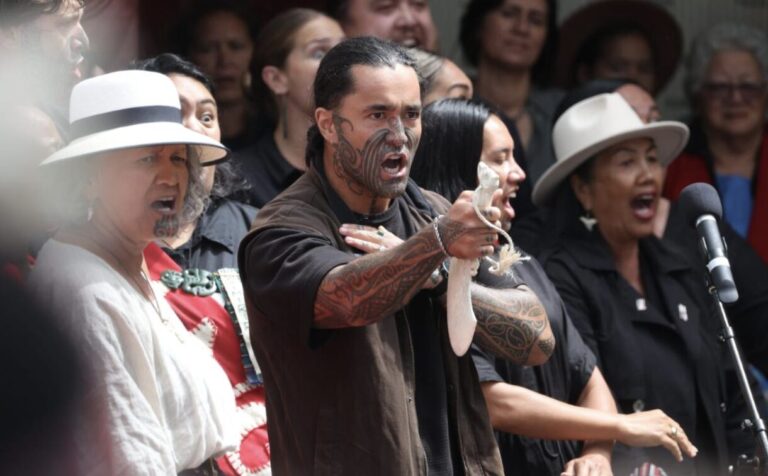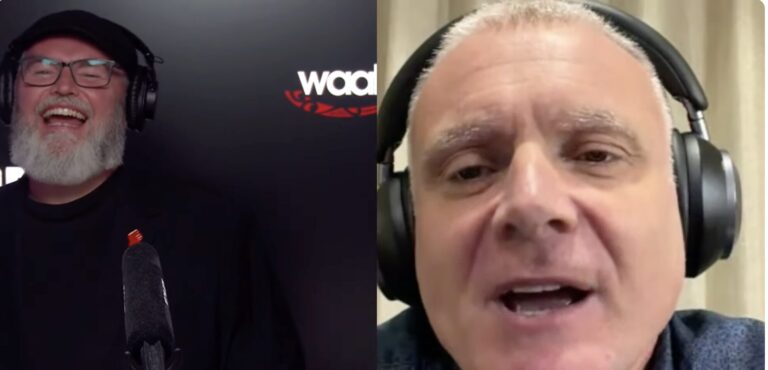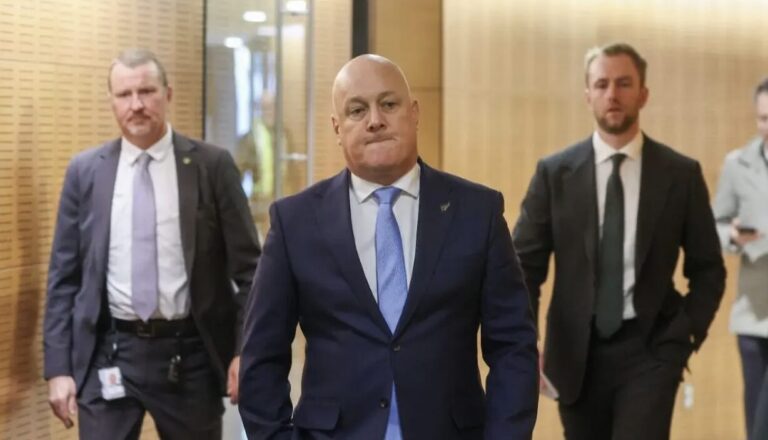GUEST BLOG: Ian Powell – Health minister unethical over medical ethics
On 17 October I received a brief email from a former Association of Salaried Medical Specialists (ASMS) Vice President: “Can’t wait for your blog covering the reception of Simeon Brown at conference yesterday!!”
The context was the aggressive address of Minister of Health Simeon Brown to the ASMS Annual Conference.
As reported by Radio New Zealand’s Ruth Hill (16 October), Brown accused senior doctors of crossing an “ethical line” by taking strike action involving non-acute care: Crossing ‘ethical line’.

Simeon Brown in attack mode with crossing ethical line accusation
His accusation was made in the lead up to the ‘mega strike’ of around 100,000 senior doctors, nurses, teachers and public servants on 23 October.
It included misleadingly Brown claiming that patients were paying the price for the strike action and that ASMS had walked “away from negotiations.”
Further, he added, “Patients should never be collateral damage in disputes between management and unions.” He urged ASMS to call of the strike action and return to negotiations (conveniently ignoring that it never left them).
Clicking my heels but how?
As the ASMS Executive Director until 31 December 2019, what could I do but click my heels and obey the former Vice President. But this left me with a problem of what to focus on in a short blog.

Attack dog Judith Collins published a strident and inaccurate open letter
The health minister had raised several options. One was the fact that his address, reinforced by Public Services Minister Judith Collins’ stridently inaccurate ‘attack dog open letter’ attack on the health and education unions (19 October) Strident government attack, is the most aggressive and hardline government approach towards health unions, at least, since I first became involved with the newly formed ASMS in 1989.
Another was the deliberate use of misleading claims such as Brown accusing ASMS of not being prepared to negotiate while, at the same time, Health New Zealand was refusing to meet ASMS to discuss negotiations Also deliberately misleading was his false claim about senior doctors’ average salaries.
Eventually I landed on the accusation that triggered much of the media interest and most of the criticisms from ASMS conference delegates; that is, Brown’s claim that senior doctors were crossing an ethical line.
Understanding medical ethics
As Ruth Hill reported there were “audible cries of disbelief” from the delegates. Also see Stuff journalist Bridie Witton’s coverage (16 October): Boos and backlash.
Let’s get back to basics. Ethics is the branch of knowledge that deals with moral principles that govern a person’s behaviour or the conducting of an activity.
Following on, medical ethics is the disciplined study of morality in medicine and concerns the obligations of doctors and healthcare organisations to patients as well as the obligations of patients.

Hippocrates developed the oath that formed the original basis of medical ethics
Medical ethics starts with the Hippocratic Oath beginning with its first principle of ‘first do no harm’.
As part of an earlier post on the ancient Oath and this principle (5 February 2022) I argued that not only were they still relevant today, but that they should be applied to the whole of our health system, including its leadership: An Oath that stands the test of time.
Who really crossed the ethical line?

Bioethics lecturer Dr Elizabeth Fenton gets to the core of whether striking senior doctors are crossing an ethical line
Dr Elizabeth Fenton is a lecturer in bioethics at Otago University. On 22 October she had an article published in The Conversation that shone a penetrating analytical light on Simeon Brown’s ethical line crossing claim: Who is really crossing the ethical line?
Her observations included:
Striking is an option of last resort. In healthcare, it causes disruption and inconvenience for patients, whānau and the health system – but it is ethically justified.
Arguably, it is ethically required when poor working conditions associated with staff shortages, inadequate infrastructure and underfunding threaten the wellbeing of patients and the long-term sustainability of public health services.
The real ethical issue is successive governments’ failure to address these conditions and their impact on patient care.
In response to the health minister’s implication that striking doctors are failing to meet their ethical obligations to provide healthcare, she noted that:
These are the same doctors who, alongside nurses, carers and allied health professionals, kept New Zealand’s health system functioning during the COVID pandemic in the face of heightened personal risk, often inadequate protections and substantial additional burdens.
While the duty of care is of primary ethical importance, codes of ethics also recognise doctors’ duties to all patients, and responsibilities to advocate for adequate resourcing in the health system. These duties may justify compromising care to individual patients under the circumstances in which industrial action is considered.
Further, doctors:
…are striking because their ability to meet these obligations [to provide high quality care] is routinely compromised by working conditions that contribute to burnout and moral injury – the impact of having to work under circumstances that violate core moral values.
A key goal of the industrial action is to demand better conditions for clinical care, such as safe staffing levels, that will benefit patients and staff and improve the health system for everyone.
The penultimate final word
In the context of Dr Fenton’s incisive analysis, as reported by Ruth Hill in her above-mentioned Radio New Zealand item it is appropriate to leave the penultimate final word to the response of senior doctors at the ASMS annual conference to Simeon Brown’s ethical line crossing accusation. These comments were made in amongst their boos and groans.

Dr Katie Ben: operating lists routinely being cancelled (The Press)
ASMS President and Nelson Hospital anaesthetist Dr Katie Ben said:
We have now taken to putting the number of times the patient has been cancelled on the operating list to ensure the patient doesn’t get cancelled for the fourth, fifth or sixth time. Non-clinical managers were cancelling planned care because they could not fill rosters.
Waikato Hospital rheumatologist Dr Alan Doube said many people (with crippling chronic conditions) did not even get a first specialist appointment (FSA).
In Waikato we decline regularly 50 percent of our FSA so we can provide some kind of sensible ongoing care.
Emergency medicine specialist Dr Tom Morton at Nelson Hospital added:
Our ED waiting time have blown out with more than doubling of patients leaving without being seen, which I think is a significant marker of unmet need that’s not being recorded or reported on officially.
The ultimate final word: nailing who crossed an ethical line
In a subsequent Radio New Zealand item (17 October) the health minister threatened a law change to remove senior doctors’ right to strike: Right to strike threatened.

Malcolm Mulholland nails who crossed an ethical line
The reported response of leading patient advocate Malcolm Mulholland nailed who was crossing the ethical line. Describing Simeon Brown’s threat as “pathetic”, he added:
I think the reason why our doctors and our nurses are striking is because there’s just simply not enough staff. I don’t know how many times they have to tell him until they are blue in the face.
You know, all this talk about crossing an ethical line, I would say take a look in the mirror, minister.
Indeed health minister; look in the mirror! It is the striking doctors who are acting in accordance with the Hippocratic Oath and adhering to the principle of ‘first do no harm’. It is the health minister who is not.






Nz voted national to power America voted trump, just what they wanted?
Damn good blog Ian .
Keep them coming.
I’ll say it again, Brown is immature and has deep right wing vein thrombosis when it comes to unions. Brown would quite happily axe unions altogether to run a dictatorship style health system. Even worse Brown is simply not qualified to be health minister. Even his addressing of the ASMS was virtue signaling political talk, no actual intellectual health analysis because he is incapable of it.
Hardly surprising he was laughed at. Rather than accepting he was wrong, his method is to double down with disinformation and outright lies. Whilst Reti struggled in the health portfolio at least he was a doctor and new a little of what was going on, Brown is clueless and talks jargon.
I love it when a government MP talks about observing ethical behavior (legislation under urgency anyone?). It keeps me amused for hours.
Simeon Brown – an MP devoid of scruples and of very low calibre! In fact he can’t speak without telling lie upon lie. We are not fooled by the “little boy lost” look. He pretends he is unable to see what the rest of us find glaringly obvious! In other words, he is in denial. What in God’s name did NZ do to deserve such a lunatic bunch of dissidents? Time for a mass protest to get rid of this vermin and put us out of our misery. However if it gets to a snap election, continue to regularly check your electoral roll details as it looks like an unscrupulous meddler is into that area as well. Either phone 0800 367656 or email https://elections.nz/contact/
Pathetic PG.
‘Pathetic.’
Well stop looking at your reflection and get a life.
Bob the F/w – I would be horrified if you had backed me as your views are so outdated. You really shoud be posting on the Kiwi-blog it’s right up your ‘narrow-minded’ alley!